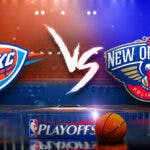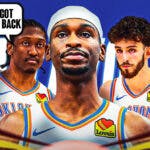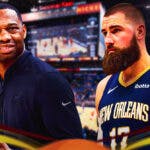The Oklahoma City Thunder completed an unforeseen 25-point comeback on a Utah Jazz team that had grabbed this series by the head, winning three games in a row and holding OKC to a mere 12 points in the second quarter of Game 5, sporting a healthy 15-point lead heading into halftime.
Yet there are a coalition of dynamic factors that spurred this comeback, which in retrospect, don't bode well for this Oklahoma City side going into Game 6.
3. Rudy Gobert's foul trouble.
Gobert picked up two quick fouls in the first 2:37 of the third quarter, quickly taking a seat with four of them. The Jazz led by 20 before his departure.
He would return four minutes later, only to pick up his fifth personal foul during an over-the-back offensive rebounding opportunity, forcing him to head to the bench once again.
His total court time? — 3 minutes and 58 seconds during the third quarter.
Gobert didn't re-enter the game until the 7:58 mark of the fourth period, with his team already down with Paul George and Russell Westbrook having dealt the damage during his absence, scoring or assisting in 32 straight Thunder points during the third quarter.
The Stifle Tower was forced to dial back his aggressiveness, facing the possibility of fouling out of the game, playing a tentative game until the very end of regulation, scoring only a put-back dunk since coming into the game.
According to Fred Katz of The Norman Transcript, the Thunder have only scored 96.7 points per 100 possessions with Gobert on the floor. That number changed by nearly 20 points with him off the floor — registering 116.1 points per 100 possessions when he's on the bench.
2. The Russ & Playoff P show.
Westbrook and George took over the game in the third quarter, seemingly making every play as OKC's furious rally quickly chipped away at the Jazz's lead.
With Carmelo Anthony enjoying the view from the bench, the dynamic All-Star duo dribbled the ball a combined total of 410 times during the last 20 minutes of the game, according to ESPN's Micah Adams. The rest of the team? — they only took 10 dribbles.
This was the case of two superstars catching fire at the same time and playing off each other — resulting in an unsurmountable display of firepower, which ultimately earned them a 107-99 win to stave off elimination.
1. Steven Adams' motion picture facilitated it all.
Adams, who was the league's second leader in screen assists, had a perplexing 16 screen assists all on his own, despite the Thunder only having 13 total assists in the game, per Katz.
For greater perspective, Adams' averaged 4.8 screen assists per game throughout the regular season.
While the big man's constant activity at the offensive end proved a major facilitator for George and Westbrook to do their damage, combined for 79 of the team's 107 points of offense, it also requires both stars to constantly hit shots — and they both shot under 50 percent from the field despite scoring 34 and 45 points, respectively.
George and Westbrook were forced to shoot until their arms fell off, combining for 65 of the team's 89 shot attempts (73 percent) — rendering every other player to six shots or less, including Anthony, who only played 25 minutes in the tilt.
OKC will need for the stars to align once again not once, but twice throughout this series in hopes to come out of the first round, a probability that is slimmer by the minute against a team that has proven to adjust well after losses and boasts an immense home court advantage.




